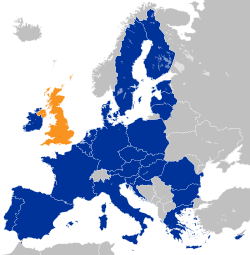London independence
.svg.png)
| Part of a series of articles on the |
| United Kingdom in the European Union |
|---|
 |
|
Membership
Legislation |
|
London independence, sometimes shortened to Londependence,[1] refers to a belief favouring autonomy or urban secession for Greater London. Its goal is either greater autonomy for London as a country separate from England or full-fledged independence as a city-state separate from the United Kingdom, sometimes with the latter as a long-term goal.
Movement
London's status within the United Kingdom has been debated for several years, with frequent calls for increased autonomy,[2][3] Supporters have frequently cited Greater London's population of over 8 million people, its economic size, its global role, its diverse population and its unique challenges compared to the rest of England as reasons for greater autonomy. The idea of London becoming a city-state was discussed from the 1990s, and resurfaced during the Scottish independence referendum of 2014.[3]
The movement for either increased autonomy or full sovereignty received a boost following the UK EU referendum in 2016, during which the UK as a whole voted to leave the European Union, although the majority of London voted for the UK to remain in the EU. This led to over a hundred thousand Londoners petitioning Sadiq Khan, Mayor of London online to seek London's independence from the UK so it could remain part of the EU. Supporters cite London's status as a "world city" and its demographic and economic differences from the rest of the United Kingdom, and argue that it should become a city-state based on the model of Singapore, while remaining an EU member state.[4][5][6][7][8][9][10]
Spencer Livermore said that London's independence "should be a goal", arguing that a London city-state would have twice the GDP of Singapore.[11] Tony Travers argued that Khan would be "well within his rights to tell the government London didn't vote for Brexit and that City Hall now viewed the government as dysfunctional." Analyst Kevin Doran said that London becoming an independent state is not just possible, but inevitable "within 20 to 30 years' time."[12]
After the EU referendum vote, Peter John, the Labour Party leader of the London Borough of Southwark stated it would be a "legitimate question" for London to consider its future in the United Kingdom and the European Union. Southwark had voted 72% in favour of remaining in the EU. John also said "London would be the 15th largest EU state, bigger than Austria, Denmark and Ireland and our values are in line with Europe – outward looking, confident of our place in the world, enriched by our diversity and stronger working together with our friends and neighbours than we are alone."[13]
Public opinion
Several opinion polls have been undertaken on Londoners' preferred constitutional status.
| Date(s) conducted | Polling organisation/client | Sample size | Status Quo (London Assembly) | London Parliament | Abolish the Assembly | London Independence | Undecided | |||
|---|---|---|---|---|---|---|---|---|---|---|
| 1–6 July 2016 | YouGov/Evening Standard | 1,061 | 32% | 23% | 7% | 11% | 28% | |||
| 24 Jun 2016 | David Cameron resigns as Prime Minister of the United Kingdom | |||||||||
| 23 Jun 2016 | EU membership referendum, 2016. | |||||||||
| 5 May 2016 | London mayoral election, 2016. | |||||||||
| 5 May 2015 | United Kingdom general election, 2015. | |||||||||
| 8–13 Oct 2014 | YouGov/Evening Standard | 30% | 30% | 6% | 5% | 29% | ||||
See also
References
- ↑ "'Londependence' May Be a Dream, but More Autonomy for the City Is Not". The New York Times. 28 June 2016.
- ↑ "The UK needs a devolved government for London". 30 January 2016.
- 1 2 Smith, Richard G. "London after Brexit: independence a non-starter but special status could protect global position".
- ↑ "Second Scotland Referendum 'Highly Likely'".
- ↑ Hedges-Stocks, Zoah. "Londoners call for independence from UK".
- ↑ "It's time for London to leave the UK". 24 June 2016.
- ↑ "Thousands call on Sadiq Khan to declare London's independence". 24 June 2016.
- ↑ "'Londependence' petition calls for London to join the EU on its own". 24 June 2016.
- ↑ "Londoners want their own independence after Brexit result".
- ↑ Metro.co.uk, Nicole Morley for (24 June 2016). "70,000 sign petition for London to become independent and rejoin the EU".
- ↑ "London Independence Goes Beyond A Twitter Joke With Politicians Seriously Discussing It". 24 June 2016.
- ↑ "London independence: Could the capital break away from the UK?".
- ↑ Alex Yeates (24 June 2016). "Southwark Council Leader backs calls for London to consider independence from UK after EU Referendum result". Southwark News. Retrieved 26 June 2016.